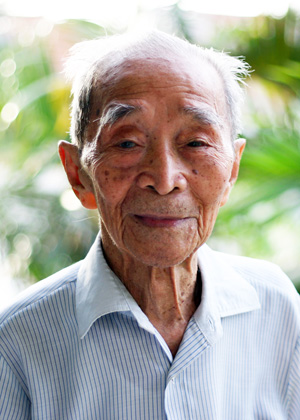Chau Sen Cocsal Chhum facts for kids
Quick facts for kids
Samdech
Chau Sen Cocsal Chhum
|
|
|---|---|
|
ចៅ សែនកុសលឈុំ
|
|

Chhum in November 2004
|
|
| Prime Minister of Cambodia | |
|
Acting
|
|
| In office 6 August 1962 – 6 October 1962 |
|
| President | Norodom Sihanouk |
| Preceded by | Nhiek Tioulong |
| Succeeded by | Norodom Kantol |
| President of the National Assembly | |
| In office 1966–1968 |
|
| In office 1962–1963 |
|
| Personal details | |
| Born | 1 September 1905 Tri Tôn, Châu Đốc, Cochinchina, French Indochina (now An Giang, Vietnam) |
| Died | 22 January 2009 (aged 103) Phnom Penh, Cambodia |
| Nationality | Cambodian |
| Political party | Sangkum (1955–1970) |
| Spouse |
Vann Thi Hai
(m. 1940) |
| Children | 7 |
| Relatives | Koun Wick (cousin) |
| Ethnicity | Khmer Krom |
Chau Sen Cocsal (Khmer: ចៅ សែនកុសលឈុំ, Chau Sênkŏsâl; September 1, 1905 – January 22, 2009), also known as Chhum (Khmer: ឈុំ, Chhŭm), was an important Cambodian government official and politician. He served as the Prime Minister of Cambodia in 1962. He was also the President of the National Assembly twice, from 1962 to 1963 and again from 1966 to 1968.
Chhum lived for over 103 years. This made him one of the longest-living state leaders in the world with known birth and death dates. In 1993, King Norodom Sihanouk gave him the special honorary title "Samdech".
Contents
Early Life and Education
Chhum was born on September 1, 1905. His family was Khmer (Khmer Krom) and lived in Tri Tôn, which was part of French Indochina at the time. This area is now in Vietnam.
He went to primary school in Phnom Penh, Cambodia. Later, he moved to Saigon to attend the Lycée Chasseloup Laubac. At 21, Chhum made history. He became the first Cambodian to graduate from that school. He earned a special degree in French and Philosophy. After graduating, he started working for the French Colonial Administration in Phnom Penh. This was the government system run by France in Cambodia.
Career in Public Service
Chau Sen Cocsal's career in government began in 1928. He was promoted to Deputy Governor of Takéo Province. He then worked in different districts, including Tralach and Thbaung Khmaum. In 1938, Chhum became the Governor of Svay Rieng Province. From 1940 to 1944, he was the Governor of Kompong Chhnang Province.
During World War II, Japanese forces occupied Cambodia. Chhum bravely refused to make people work for the Japanese. Instead, he joined a resistance movement in the jungle. This group fought for Cambodia's freedom.
Post-War Roles and Diplomacy
After the French government returned, Chhum continued his public service. In 1945, he was named Mayor of Phnom Penh. He then served as Governor of Kompong Cham Province in 1946. In 1948, he became Governor of Kandal Province.
In 1951, Chhum took on a new role. He was sent to Thailand as Cambodia's first ambassador to a foreign country. An ambassador represents their country in another nation. Chhum returned to Cambodia in 1952. He once again joined the fight for Cambodia's independence from France.
National Assembly and Retirement
In 1955, Chau Sen Cocsal was elected to the Cambodian National Assembly. He represented Kompong Cham Province. From 1958 to 1963, he served as the President of the National Assembly. This is a very important leadership position in the country's law-making body. In 1969, at 64 years old, Chhum decided to retire from public office.
Later Years and Return to Service
In April 1975, a new government took over Cambodia. While visiting family, Chau Sen Cocsal was arrested by Vietnamese authorities. He was held for 17 months and then spent two years under house arrest. With help from France, Chhum was released. He and his wife were allowed to move to France.
In 1991, after peace agreements were signed, King Norodom Sihanouk asked Chhum to return to public service. He was named President of Cambodia's Supreme National Council (SNC). This council helped guide the country. From 1992, he became a High Privy Advisor to King Norodom Sihanouk. In 1993, he received the highest rank in Cambodia's civil service, "Samdech". That same year, he became the Dean of the Constitutional Council. This council helps make sure laws follow the country's constitution. Chhum retired for a second time in 2007.
He received several honors for his service. These include the Grand Croix de l'Ordre Royal from Cambodia. He also received the Commandeur de la Légion d'honneur from France.
Death and Legacy
Chau Sen Cocsal Chhum passed away peacefully on January 22, 2009. He was 103 years old. He was the last remaining civil servant from the French Administration era in Cambodia. His funeral was public and included full military honors.
Many important people and groups honored him. These included King Father Norodom Sihanouk and King Norodom Sihamoni. France's Ministry of Foreign Affairs and the Khmer Krom community also paid tribute. His family wrote that he should be remembered as "a man considerate of the rights of others." They said he always had kind words for everyone. Chhum believed he was simply a servant to his country. Before he died, he even asked his grandson to apologize for any traffic his funeral procession might cause. His greatest pride was serving his country faithfully.
From June 10, 2004, until his death, Chhum was the world's oldest living former head of state.
Personal Life
On April 2, 1940, Chau Sen Cocsal married Vann Thi Hai. They had seven children together.
 | Aurelia Browder |
 | Nannie Helen Burroughs |
 | Michelle Alexander |

